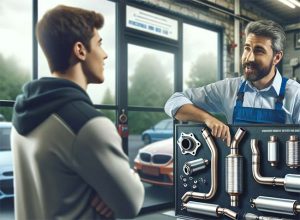The exhaust system in a vehicle is a silent champion of performance, often overlooked in the discussion of horsepower and efficiency. It plays a pivotal role not just in minimizing emissions and noise but in enhancing the overall power output of the engine. The intricate design of an exhaust system, from its manifold to the tailpipe, is a testament to its importance in engine performance. Each component works synergistically to ensure that exhaust gases are expelled effectively, thereby allowing the engine to breathe better and operate more efficiently. Understanding the critical role of exhaust systems in affecting horsepower is essential for automotive enthusiasts and professionals alike, as it opens up avenues for performance optimization and vehicular improvements.
Basics of How Exhaust Systems Work
The exhaust system is a complex network of components, each with a specific function, all contributing to the efficient expulsion of exhaust gases from the engine. Starting with the exhaust manifold, which collects gases from the engine’s cylinders, the system leads these gases through a series of channels. The catalytic converter plays a critical role in reducing harmful emissions, converting them into less harmful substances. Following this, the muffler reduces the noise produced during the process, and finally, the tailpipe releases the treated gases into the atmosphere. The efficiency of this flow and the reduction of backpressure are crucial in determining how well the engine performs. A well-designed exhaust system not only complies with environmental standards but also enhances the engine’s ability to generate power, making an understanding of its workings fundamental for anyone keen on vehicle performance.
Do Exhaust Systems Increase Horsepower?
The question of whether exhaust systems increase horsepower is met with a resounding affirmative. The principle behind this increase lies in the concept of backpressure. In simple terms, backpressure refers to the resistance encountered by exhaust gases as they exit the engine. High backpressure means the engine has to work harder to push out these gases, which can hamper its efficiency. A well-designed exhaust system minimizes this backpressure, allowing the engine to expel exhaust gases more freely. This reduction in backpressure directly translates to an increase in the engine’s efficiency and power output. By allowing the engine to breathe more easily, an optimized exhaust system ensures that every fuel burn contributes more effectively to generating power, leading to an increase in horsepower. This understanding is crucial for anyone looking to enhance their vehicle’s performance, as it underscores the direct impact that exhaust systems have on a car’s power and efficiency.
Types of Exhaust Systems and Their Impact on Performance
 Exhaust systems come in various forms, such as cat-back, axle-back, and header-back, each tailored to different performance needs. The choice of system can significantly impact a vehicle’s horsepower and overall performance. Here’s a list of common types of exhaust systems and their features:
Exhaust systems come in various forms, such as cat-back, axle-back, and header-back, each tailored to different performance needs. The choice of system can significantly impact a vehicle’s horsepower and overall performance. Here’s a list of common types of exhaust systems and their features:
-
Cat-Back Systems: Replace everything from the catalytic converter to the tailpipe. Known for balancing cost and performance improvement.
-
Axle-Back Systems: Involve components from the rear axle to the tailpipe, offering a more affordable option for sound and aesthetic enhancements.
-
Header-Back Systems: Encompass the entire exhaust system from the engine header to the tailpipe, providing the most comprehensive upgrade for performance enhancement.
Installing and Maintaining an Exhaust System
Installing an exhaust system is a task that demands precision, technical knowledge, and a deep understanding of your vehicle’s specific mechanics. While enthusiasts with mechanical skills may attempt this, it is generally recommended to seek professional assistance for installation to ensure optimal performance and prevent any potential issues. Once installed, regular maintenance is key to preserving the system’s efficiency. This includes routine checks for leaks or damage, ensuring all components are securely fastened, and monitoring for any unusual noises or emissions. Proper maintenance not only extends the life of the exhaust system but also ensures that the vehicle consistently operates at peak performance. Additionally, for Jeep Cherokee owners looking to further boost their vehicle’s performance, combining a high-quality exhaust system with the best cold air intake can provide significant improvements. This synergy enhances airflow to the engine and optimizes exhaust gas expulsion, collectively contributing to a noticeable increase in power and efficiency.
Conclusion: The Verdict on Exhaust Systems and Horsepower
In summary, exhaust systems play a fundamental role in enhancing a vehicle’s horsepower. They achieve this by efficiently managing and minimizing backpressure, allowing the engine to operate more freely and effectively. The choice of an exhaust system should be made with consideration to the vehicle’s specific needs and characteristics, ensuring compatibility and maximum performance enhancement. With the correct system in place, maintained diligently, a vehicle can experience a significant improvement in power, efficiency, and overall driving experience. This makes the investment in a quality exhaust system a wise choice for anyone looking to upgrade their vehicle’s performance. In the world of automotive enhancements, the exhaust system stands out as a key component in the quest for increased horsepower and optimal engine performance.


Add Comment